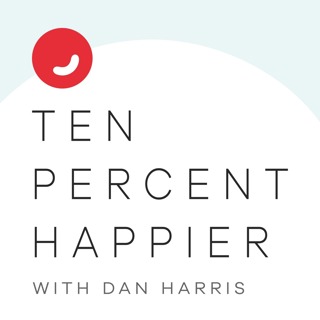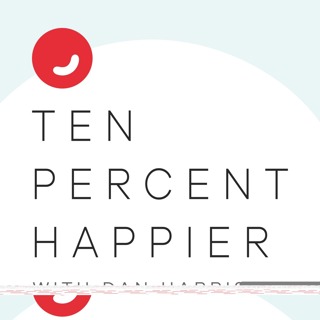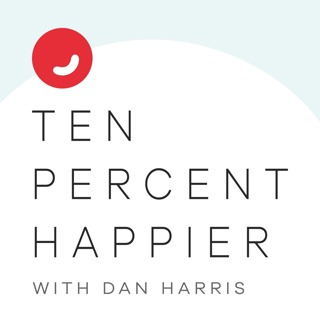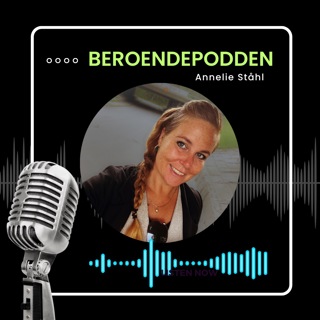
What Does it Actually Mean to Be a "Whole Person"? | Scott Barry Kaufman
In this episode, we’re going to demystify concepts such as: self actualization, personal growth, authenticity, and bringing your “whole self” to the table. Scott Barry Kaufman is a cognitive scientist and humanistic psychologist. He is the founder and director of the Center for the Science of Human Potential at the University of Melbourne’s Centre for Wellbeing Science. He also hosts the #1 psychology podcast in the world - The Psychology Podcast. And he is the author of a new book called Transcend: The New Science of Self-Actualization. We talk about the meaning of “transcendence” and the difference between transcending in an unhealthy and healthy way; being compassionate, understanding, accepting, forgiving, and perhaps even loving about your foibles and ugliness; and the difference between authenticity and “pseudo-authenticity”. You can download the Ten Percent Happier app here today: https://10percenthappier.app.link/install Here are the steps for sending us a question for our upcoming Work Life Series: 1. Go to a quiet place and open the default voice memo recording app on your phone. 2. Hold the phone about 8-10 inches from your face, then tap “record.” 3. Tell us your name, where you’re from, and what your question is. Try to keep it to about a minute or so. 4. Stop the recording, then check it to make sure it sounds clear. 5. Email it to us at: listener@tenpercent.com by September 27, 2021. Full Shownotes: https://www.tenpercent.com/podcast-episode/scott-barry-kaufman-381
22 Sep 20211h 1min

Psychedelics and Meditation | Michael Pollan
Michael Pollan has done more than perhaps anybody else in recent history to change the conversation on the use of psychedelic drugs, or plant medicine. He is author of the best selling book called How to Change Your Mind and he recently followed up with another book called This is Your Mind on Plants. Pollan is also the co-founder of the University of California Berkeley Center for the Science of Psychedelics, along with another recent podcast guest, Dacher Keltner. In this conversation we talk about whether psychedelics and meditation can mix and the links between psychedelics, meditation and Buddhism; the universal human drive to change consciousness; and his experiences with the three plants that he focuses on in his new book: opium, caffeine, and mescaline. Please note: this episode contains conversations about depression, suicide, and substance use. Here are the steps for sending us a question for our upcoming Work Life Series: 1. Go to a quiet place and open the default voice memo recording app on your phone. 2. Hold the phone about 8-10 inches from your face, then tap “record.” 3. Tell us your name, where you’re from, and what your question is. Try to keep it to about a minute or so. 4. Stop the recording, then check it to make sure it sounds clear. 5. Email it to us at: listener@tenpercent.com by September 27, 2021. Download the Ten Percent Happier app today: https://10percenthappier.app.link/install Full Shownotes: https://www.tenpercent.com/podcast-episode/michael-pollan-380
20 Sep 202151min

How to Get the Wisdom of Old Age Now | Dilip Jeste
Happiness levels are really high when we’re young. They then steadily dip through our 20s, 30s, and 40s, and bottom out in our early 50s–at which point, they make a sharp and sudden rise. Then, through our 60s, 70s, and 80s, they are way above where we were in our youth. Why is this? Why do we get happier even as our bodies are falling apart? Here’s another question: Why, from the standpoint of evolution, do humans stick around way past the point of reproductive age? The answer to all of these questions, per our guest today, is: wisdom. Dr. Dilip Jeste is a Distinguished Professor of Psychology at the University of California, San Diego, and the author of Wiser: The Scientific Roots of Wisdom, Compassion, and What Makes Us Good. In this conversation, we talk about how exactly he defines wisdom, what people of all ages can do to become wiser now, and the relationship between wisdom and loneliness. A quick content warning: this conversation includes references to sensitive topics, including suicide, substance abuse, and depression. Download the Ten Percent Happier app today: https://10percenthappier.app.link/install Full Shownotes: https://www.tenpercent.com/podcast-episode/dilip-jeste-379
15 Sep 20211h 2min

Life, Interrupted | Suleika Jaouad
Here’s a thought experiment: how would you handle it if you got a terrible diagnosis? Of course, many of us have no choice but to find out. This is the situation Suleika Jaouad faced when she got gravely ill at a very young age. She had to figure out how to have a sense of agency when so much was out of her control, and how to stay awake and present when her life was hanging in the balance. Suleika Jaouad is a journalist, author, speaker, cancer survivor, and the author of a book called Between Two Kingdoms: A Memoir of a Life Interrupted. She is also the creator of “Life, Interrupted,” the Emmy award-winning New York Times column and video series that she created from her hospital bed. In this conversation, we talk about: Suleika’s journey from being diagnosed with leukemia as a young adult to her recovery today; managing your emotions in excruciating situations; handling an ocean of uncertainty; feeding your need for creativity and productivity when your body is in mutiny mode; and the immense value of strategically going easy on yourself, especially when you’re an ambitious person. Download the Ten Percent Happier app today: https://10percenthappier.app.link/install Full Shownotes: https://www.tenpercent.com/podcast-episode/suleika-jaouad-378
13 Sep 20211h

A More Relaxed Way to Meditate | Alexis Santos
A common problem among type-A people is trying to win at meditation. But the practice doesn’t work like that. If you over-effort, if you try to make something happen, it’s pretty much guaranteed not to happen. What is guaranteed is that you will suffer. Meditation is like a video game where you can’t move forward if you want to move forward too badly. Our guest today is Alexis Santos, who has been practicing meditation for twenty years and was a student of the highly influential Burmese monk Sayadaw U Tejaniya. Alexis is also a core teacher in the Ten Percent Happier app and the lead teacher of our On the Go course. In this episode, Alexis recounts his time learning from Sayadaw and shares an approach to meditation that is more relaxed than what many of us may be used to. It just might change your practice. Watch Season 2 of Ted Lasso on Apple TV+. Subscription required. Apple TV+ and/or select content may not be available in all regions. To join the Ted Lasso Challenge by midnight tonight, download the Ten Percent Happier app here: https://10percenthappier.app.link/install Full Shownotes: https://www.tenpercent.com/podcast-episode/alexis-santos-377
8 Sep 202155min

Letting Go of Perfectionism | La Sarmiento
In this episode, we’re talking about the difference between kindness and what our guest, La Sarmiento, calls “radical kindness,” how to muster the strength to be kind to annoying people while setting appropriate boundaries, the difference between radical compassion and what the Tibetans call “idiot compassion,” and their experience of learning to accept themselves in a culture that is not always so welcoming. Sarmiento, whose pronouns are they/them, has been practicing Vipassana meditation since the 1990’s. They are a graduate of the Spirit Rock Community Dharma Leader Training Program and a mentor in the Mindfulness Meditation Teacher Certification Program. They serve as the guiding teacher for the BIPOC and LGBTQ+ sanghas at the Insight Meditation Community of Washington, DC, where they are also board president. We are bringing you this Ten Percent Happier podcast series in collaboration with the Apple TV+ Original Series Ted Lasso because kindness is a huge theme in the show, and there are many practical lessons embedded right in the plot. CTA: Watch Season 2 of Ted Lasso on Apple TV+. Subscription required. Apple TV+ and/or select content may not be available in all regions. Download the Ten Percent Happier app today: https://10percenthappier.app.link/install Full Shownotes: https://www.tenpercent.com/podcast-episode/la-sarmiento-376
6 Sep 20211h 1min

Reversing the Golden Rule | Jamil Zaki
In this episode we’re talking about how what you believe— about yourself, or about the world — can become a self-fulfilling prophecy. So if you believe the world is a cold and unforgiving place, it can become that way. And if you believe that you have limited capacities for kindness, you can, in effect, make it so. Our guest is Jamil Zaki, who is making his second appearance here on the show. Jamil is a professor of psychology at Stanford University and the director of the Stanford Social Neuroscience Lab. He is a leading expert on empathy and the author of the book The War for Kindness. Jamil discusses three levels of kindness: kindness toward ourselves, kindness in our close relationships, and kindness in our communities. He argues that starting with the self is critical, but also that the kinder we can make our communities, the kinder we will be ourselves. And the more we reorient ourselves to focus on the positive, the more we can create a self-fulfilling prophecy of kindness. We are bringing you this Ten Percent Happier podcast series in collaboration with the Apple TV+ Original Series Ted Lasso because kindness is a huge theme in the show, and there are many practical lessons embedded right in the plot. Watch Season 2 of Ted Lasso on Apple TV+. Subscription required. Apple TV+ and/or select content may not be available in all regions. To sign up for the Ted Lasso Challenge, download the Ten Percent Happier app today: https://10percenthappier.app.link/install Full Shownotes: https://www.tenpercent.com/podcast-episode/jamil-zaki-375
1 Sep 20211h

The Evolutionary Case for Kindness | Dacher Keltner
Here’s a question: Is there an evolutionary advantage to being kind? Our guest today is Dacher Keltner, an eminent scientist who will make the case that, contrary to popular conceptions of evolution (dog-eat-dog, survival of the fittest), and contrary to a lot of what we see on the news, our species is actually uniquely wired for kindness and compassion. Dacher Keltner is the Director of the Social Interaction Lab at the University of California at Berkeley, the Faculty Director of the Berkeley Greater Good Science Center, and the author of the book Born to Be Good: The Science of a Meaningful Life. In this episode, we talk about Darwin’s perspective on human sympathy and selfishness, where he stands on the question of Original Sin versus Buddha Nature, the importance of touch when it comes to communicating compassion, and the relationship between teasing and kindness. We are bringing you this Ten Percent Happier podcast series in collaboration with the Apple TV+ Original Series Ted Lasso because kindness is a huge theme in the show, and there are many practical lessons embedded right in the plot. Watch Season 2 of Ted Lasso on Apple TV+. Subscription required. Apple TV+ and/or select content may not be available in all regions. Download the Ten Percent Happier app today: https://10percenthappier.app.link/install Full Shownotes: https://www.tenpercent.com/podcast-episode/dacher-keltner-374
30 Aug 202158min





















